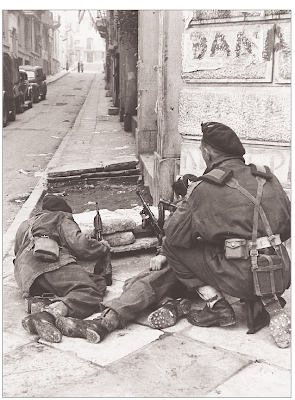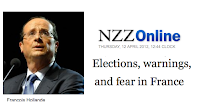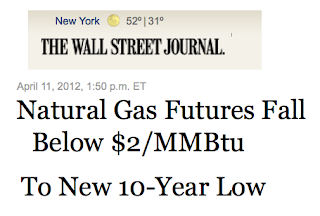Three Conversations
Courtesy of Bruce Krasting
I’ve had some interesting conversations in the past few days with folks whose opinions I consider important. I'm passing them on:
I spoke with my Greek shipper friend from Athens about the upcoming May 6 election. This is an event that should be feared by the markets according to this person.
There are two large political groups that have been the basis of coalition governments in Greece. On the right is the New Democracy party; on the left is the Pan Hellenic Socialist Movement. Both of these parties are out of favor today. The most recent polls show that the two parties together would get less than 40% of the popular vote. If this is the result, it will be very difficult to put a new governing coalition together.
There are many other smaller political parties that will get the dissenting votes. At this point it is unclear who will end up with the bargaining chips post-election. The fear is that some of the smaller parties will have a big say in the outcome. My friend had this to say:
“The other parties are communists, radicals and crazies. If they have a hand in the new government, then on May 7 Greece will be forced to take dramatic steps. The whole idea that the country should suffer, so the bankers can get paid would have to change.”
“Remember the history. After WWII there were years of fighting in the streets of Athens with the Communists. British troops were forced to come in to end the fighting.” If the Communists make a comeback in this election, then instability will follow.
“Also on May 7, the attitude in Brussels and Bonn towards Athens will change as well!”
May 7th is sixteen trading days from today….
.
II
I spoke with a guy I’ve know for a long time who lives in Paris. He is an ex-banker, turned technocrat.
Paris:
The bond market has been forcing every decision by Paris, Bonn and Brussels. Every step taken has been done to make peace with bondholders. There are many who are tired of this process. The most recent effort to bring stability and support to this market has been the LTRO. As of today, this program has not succeeded. It is unlikely that it will be repeated.
BK:
Yes, the LTRO worked for less than two months. But absent a stabilization program like the LTRO or direct market purchase of bonds by the ECB, what is plan B?
Paris:
There are no good answers to this. One option would be for the ECB/IMF to make a guarantee that the annual working capital requirements of Spain, Ireland Portugal and, if necessary, Italy are met. The promise of financing would include trade deficits and interest payments. It would not cover maturing debt obligations. As debt came due, holders would be offered new three-year notes at an attractive yield. They would be forced to keep their feet in the fire.
BK:
Something like this would destroy the EU bond markets!
Paris:
They are already destroyed. They only exist because the Northern countries have provided so much support. It is a mirage that there is a true market any longer.
BK:
But what you describe would be a default. Existing bonds would collapse in price.
Paris:
Yes, but why does this matter? In some ways it would be a good thing. If Spanish bonds trade at 50 cents on the Euro, then the market is doing the job for us. The strong countries and the IMF can buy up the debt, with that comes a restructuring with lower principal. This happened to some extent in Greece.
BK:
But wouldn’t this wreck the banks?
Paris:
Why? The banks would accept new bonds in exchange for maturing ones. They would be forced to. If they did not, they would suffer an immediate loss. So the banks and their accountants would voluntarily extend the maturities without loss. The countries involved would have the necessary access to fresh debt to cover all interest. There would be no default on interest payments. No one ever expected the debt to be paid off. It never will be. But the countries can afford to pay reasonable interest.
BK:
But what about holdouts and lawsuits?
Paris:
Yes this is an issue. And yes this would be messy. But what are the options? Continuing as we have been is not acceptable. The bond markets have reacted with hostility toward the EU countries, it is not surprising to see the countries becoming hostile to the bond markets. Either there is peace, or there is war. The status quo is unacceptable. We have tried to make peace. That has not worked. Other options must be considered.
BK:
What you describe would be a dramatic shift in policy. Do you really think that what you suggest could actually happen?
Paris:
The answer to this question lies with France. As of today the French/German efforts at saving Europe have failed. The French people are tired of the process. You will see this emotion in the coming national election. Even if Sarkozy wins the election, his ability to push for additional risk sharing with the South will be lost.
Without France’s active participation in the bailouts, the process will have to end. Again, many of us are sick and tired of doing what the bond market tells us we must do. There is a limit. Many think that the limit has already been exceeded. This is especially true in France. The bailouts and special lending efforts will not last for one more year.
Note:
I don’t buy into this line of thinking (at least for the time being). What is described is something that could only happen in a worst-case scenario.
His mindset is very interesting. He’s pissed at the bond market, and he’s tired of it. He left me with the impression that he was not alone in being pissed.
This is perfectly understandable. For years the poor politicians, bureaucrats and technocrats have been scrambling to appease the fucking bond market. They’ve paid a big price so far. And it hasn’t paid off. The bond market is still their primary problem.
At some point someone will say (sort of) “Fuck the fucking bond market”. We’re getting closer by the day.
.
My friend who has been running hedge fund money for years had this to say:
“Nat Gas could go to zero. Gas is a byproduct of drilling for oil. With US oil still worth $100+ a barrel, the drilling will continue, and more gas will be the result.”
“There are many things that are changing due to the cheap Nat. gas. Companies that are running short haul truck routes out of central locations are converting to gas. Chemical companies that use natural gas as a feedstock are seeing new opportunities. The first new ethylene plant (plastic from natural gas) in many years will be built in Oklahoma. This plant was going to be built in Mexico, but cheap gas has brought it back home.”
“The near zero cost of natural gas will transform energy use in America over the next five years.”
I’m not sure I believe in this “miracle” story just yet. But coming from this guy, the conversation has me wondering.
.









